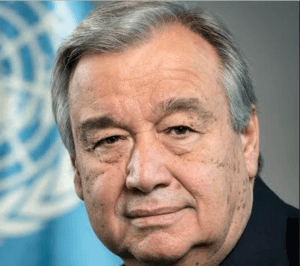UN Secretary-General’s criticism of Security Council structure legitimate – Akufo-Addo

President Nana Addo Dankwa Akufo-Addo has described as appropriate the United Nations (UN) Secretary-General’s criticism of the current structure of the Security Council.
“It is not just a matter of fairness, but also a necessity for the legitimacy and effectiveness of the UN in maintaining global peace and order,” he noted while delivering a paper at the Fifth Anniversary Lecture Series of the Council on Foreign Relations (CFR)-Ghana, in Accra.
António Guterres on last Monday called for urgent reform of the Security Council, criticising its outdated structure and lack of representation for Africa, which he argued undermined the body’s credibility and global legitimacy.
While underscoring the need for redress, the Secretary-General emphasised that the Council’s composition reflected the balance of power at the end of World War Two and had failed to keep pace with a changing world.
It was Guterres’ second strong appeal for reforms in less than a year, following his earlier proposal to the 78th United Nations General Assembly to modernize multilateral institutions, including the Security Council, to better reflect current realities.
“It is reform or rupture,” he told the Assembly.
President Akufo-Addo stated that Africa, which has a rapidly growing population and a significant share of the world’s resources, had remained severely underrepresented in the global security body.
The UN should vigorously pursue the Ezulwini Consensus to ensure the continent had a stronger voice in global peace and security matters, he appealed.
It was of utmost necessity to reform global governance institutions to foster the agenda of development cooperation, while aligning better with the evolving needs and aspirations of Africa and other developing regions, he added.
“I am happy to note that Antonio Guterres, the far-sighted Secretary-General of the UN, has in recent days added a considerable weight of his voice to those of the US President Joe Biden and French President Emmanuel Macron in support of this goal,” the President remarked.
The 15-member UN Security Council includes five permanent members with veto power (the ability to block decisions, even if all other members support the proposal) – China, France, Russia, the United Kingdom, and the United States – while the remaining 10 non-permanent seats are allocated regionally.
The question of equitable representation has been on the agenda for several years, including through the General Assembly’s open-ended working group and intergovernmental negotiations to address the issue.
In recent times, calls for major reform continue, particularly from underrepresented regions.
In respect of Africa, the UN Security Council has been less effective in dealing with volatile situations that threaten peace and security on the continent amid the spread of violent extremism, terrorism, as well as political and civil unrests.
It is the conviction of some key African leaders, including the Ghanaian President, that permanent representation on the Security Council would go a long way in addressing critical issues of continental peace and security.
On the declining state of security and democracy in the West African economic bloc, ECOWAS, the President Akufo-Addo reminded the leaders that development cooperation efforts would not yield results “unless we have political stability and national security.”
He cautioned that the present situation in the sub-Region, with a fragmented ECOWAS, coupled with the persistent terrorist insurgency, whose epicentre had shifted from Mali to Burkina Faso and spreading further southwards, ought to be tackled with determined coordinated efforts.
He also noted the decline in the rule of law and the complexities of some foreign countries’ involvement in community affairs.
“These paints an unattractive picture of instability and uncertainty that obviously have an adverse impact on the development investment aspirations of the region.
“Ghana, an oasis of democracy and stability in this troubled region, has an important role to play in its own self-interest, not only in stabilising the region, but also contributing to the process of restoring democracy in the entire ECOWAS space,” he asserted.
President Akufo-Addo said the country was in support of the organisation of regional security, such as participation in the impending ECOWAS standby force.
“I have little doubt that the existence of the force will offer appreciable deterrence to the spread of insurgency. It is better late than never,” he noted.
Source: GNA
